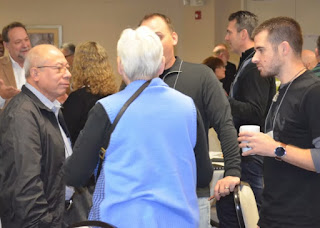"If there's a vacant tract of land in your area, one of its least desirable uses, as far as neighbors are concerned, is a church building. They aren't usually beautiful buildings. They are considered unusable by the general community. And they bring outsiders to the neighborhood every Sunday, clogging the streets and disturbing the amenity of the place. We're not saying larger congregations don't need appropriately large facilities to meet, but when the members of those congregations don't live in the neighborhood, their buildings are sadly designated LULU's (locally undesirable land use)." Michael Frost Christiana Rice (from forthcoming IVP book Altered).
I read this post from Fitch and the comments and it made me wonder. Is it offensive to think of our church buildings as "locally undesirable land use"? More so, are they?
Here's the real question... What value does our church bring to the community? Do we do for our community enough good to validate our "undesirable" land and buildings? This isn't an easy question. My knee jerk response is, "of course we do good for the community". We are here to help people to know Jesus and to have a life transformed by Him. We are a place to worship and to grow in that relationship, which has a great impact on this life and on eternity. But much of that really mostly just impacts people within our church community. Do we really do good for the outside community? And does our massive building and land make a positive impact on the landscape of our town?
So, I started to think about taxes. Based on very minimal research, I understand churches to be exempt from property taxes due to two factors. One, it keeps a separation between church and state protecting religion from too much governmental interference. And two, it was determined at one time that the value to a community that a church offers is greater than the value of their taxes. Basically, if not for churches, the government would have to spend money to pick up their slack.
On Jan. 14, 1924, the US Supreme Court interpreted the reason for the exemption inTrinidad v. Sagrada Orden: "Evidently the exemption is made in recognition of the benefit which the public derives" from churches' "corporate activities." - http://churchesandtaxes.procon.org/#background
But do we still offer enough benefit to our communities to get this privilege? It's definitely debatable.
I'm not advocating for churches losing our tax exempt status. I fear that it would be an insurmountable challenge for many churches which would have a negative impact on our society.
But talking about tax exemption does bring up some thoughts. For instance, how would paying property tax affect the way that we buy, build, and take care of our churches' properties? Would our churches be better stewards of our lands if we actually had to pay for it? My church building is large and sits on what is nearly a city block of land and grass. We rarely use all of our grounds for our ministry, but we've owned it for 60 years. If we were responsible to pay taxes on our property, would we sit on land that could be used either by us or by someone else? Or would that result in our rethinking what we hold on to?
So I had this idea. What if churches would decide to be investors in our communities in ways that we never have before? What if we estimated what taxes on our properties would be and began to invest that money in our communities? What if we set aside that money - or at least some money - and then partnered with others in the community for important projects? We could work with our towns to better our parks, to support our schools, to build bike trails, to support housing initiatives, or to help those in poverty.
Can you imagine the witness in our communities if churches would have this kind of investment? It would say to them that we are not just here for our own agendas. It would literally be putting our money where our mouths are when we say we care about our neighbors.
“Build homes, and plan to stay. Plant gardens, and eat the food they produce. Marry and have children. Then find spouses for them so that you may have many grandchildren. Multiply! Do not dwindle away! And work for the peace and prosperity of the city where I sent you into exile. Pray to the Lord for it, for its welfare will determine your welfare.” - Jeremiah 29:5-7What do you think? Are our church buildings really a LULU? Are we living up to our billing as agents of good in our communities? Could we do more?






